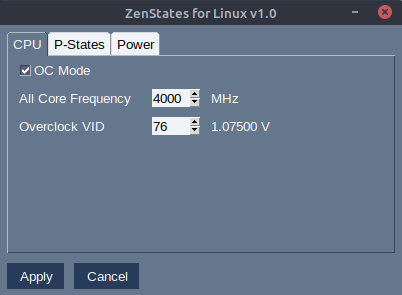Collection of utilities for Ryzen processors and motherboards
Dynamically edit AMD Ryzen processor parameters. Current version supports Zen2-based CPUs only.
Requires root access and the msr kernel module loaded (just run "modprobe msr" as root).
$ sudo modprobe msrThe utility is based on r4m0n's ZenStates-Linux.
GUI is based on PySimpleGUI.
CPUID module used: flababah's cpuid.py.
$ sudo ./zenstates.py --no-gui [args...]usage: zenstates.py [-h] [--no-gui] [-l] [-p {0,1,2,3,4,5,6,7}] [--enable] [--disable] [-f FID] [-d DID] [-v VID]
[--smu-test-message]
Sets parameters of Ryzen processors
required arguments:
--no-gui Run in CLI without GUI
optional arguments:
-h, --help Show this help message and exit
-l, --list List all P-States
-p {0,1,2,3,4,5,6,7}, --pstate {0,1,2,3,4,5,6,7}
P-State to set
--enable Enable P-State
--disable Disable P-State
-f FID, --fid FID FID to set (in hex)
-d DID, --did DID DID to set (in hex)
-v VID, --vid VID VID to set (in hex)
--c6-enable Enable C-State C6
--c6-disable Disable C-State C6
--smu-test-message Send test message to the SMU (response 1 means 'success')
--oc-frequency Set Overclock frequency (in MHz)
--oc-vid Set Overclock VID (in hex)
--ppt Set PPT limit (in W)
--tdc Set TDC limit (in A)
--edc Set EDC limit (in A)
To run the GUI, additional packages are needed:
$ sudo apt install pip3 python3-tk wheel
$ pip3 install pysimpleguiThen run:
$ sudo python3 zenstates.pyTurns on/off the Q-Code display on ASUS Crosshair VI Hero motherboards (and other boards with a compatible Super I/O chip)
Requires root access and the portio python module. To install run:
$ pip install wheel portio